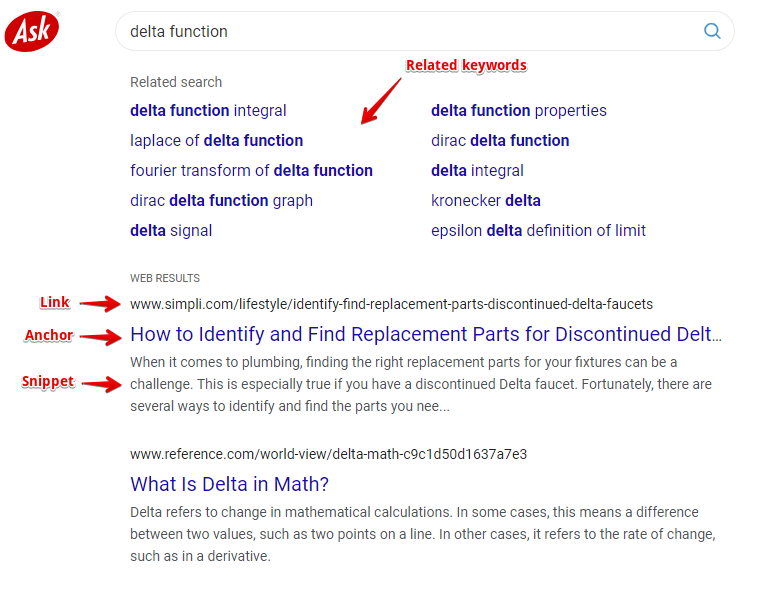SE::Ask - Google Search Results Scraper via Ask.com

Overview of the scraper
Ask search results scraperAsk search results. Thanks to the Ask scraper, you can obtain large link databases ready for further use. You can use queries in the same format you would enter them into the Ask search box, including search operators (site, inurl etc.).
A-Parser's functionality allows saving Ask scraper settings for future use (presets), ) setting up a scraping schedule, and much more. You can use automatic query multiplication, substitution of subqueries from files, iteration of alphanumeric combinations and lists to obtain the maximum possible number of results.
Results can be saved in the form and structure you need, thanks to the powerful built-in template engine Template Toolkit which allows applying additional logic to the results and outputting data in various formats, including JSON, SQL and CSV.
Collected data
- Links, anchors, and snippets from the results
- Related keywords

Capabilities
- Parses the maximum number of results available - 10 pages
- Parses up to 100 results from the US Ask.com search results
- Ability to collect related keywords
Use cases
- Collecting link databases - for A-Poster, XRumer, AllSubmitter, etc.
- Assessing competition for keywords
- Finding backlinks (mentions) of sites
- Checking site indexation
- Finding vulnerable websites
- Any other uses involving scraping Ask.com in some form
Queries
Queries should be search phrases, exactly as if they were entered directly into the Ask.com search form, for example:
test
windows Moscow
Query substitutions
You can use built-in macros to multiply queries, for example, if we want to get a very large database of forums, we specify several basic queries in different languages:
forum
forum
foro
论坛
In the query format, we specify iterating through characters from a to zzzz, this method allows maximum rotation of search results and obtaining many new unique results:
$query {az:a:zzzz}
This macro will create 475254 additional queries for each initial search query, which totals 4 x 475254 = 1901016 search queries. This number is impressive, but it's not a problem for A-Parser at all. At a speed of 2000 queries per minute, such a task will be processed in just 16 hours.
Using operators
You can use search operators in the query format, so they will be automatically added to every query in your list:
site:$query
Examples of output results
A-Parser A-Parser supports flexible result formatting thanks to the built-in template engine Template Toolkit, which allows it to output results in arbitrary form, as well as in structured form, such as CSV or JSON
Exporting list of links
Links + anchors + snippets with position output
Outputting links, anchors, and snippets into a CSV table
Saving related keywords
Saving in SQL format
Dumping results to JSON
Results processing
A-Parser A-Parser allows processing results directly during scraping, and in this section we have provided the most popular use cases for the Ask scraper
Link deduplication
Link deduplication by domain
Extracting domains
Removing tags from anchors and snippets
Filtering links by inclusion
Possible settings
| Parameter name | Default value | Description |
|---|---|---|
| Pages count | 5 | Number of pages to scrape (from 1 to 10) |
| Use http2 | ☑ | Use http2 |